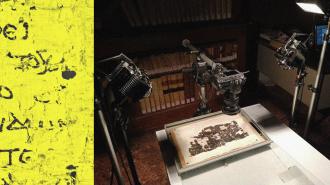Greek philosopher Plato played a huge role in shaping Western thought, particularly around politics, and even though he died more than 2,300 years ago, his “Republic” is still one of the most studied books at top US colleges.
Despite Plato’s wide and lasting influence, though, there’s still a lot we don’t know about him, including his final resting place. Historians had been able to narrow it down to the garden of the school he founded in Athens, but where exactly in the expansive gardens was a mystery — until now.
Ashes to ashes: When Mount Vesuvius erupted in 79 AD, it buried Pompeii, Herculaneum, and several other nearby villages under ash and rock. In the 1700s, archaeologists recovered nearly 2,000 papyrus scrolls from a Herculaneum villa that had been engulfed by the eruption, but many were so fragile they couldn’t be unrolled, let alone read, without crumbling.
In 2021, the European Research Council gave the GreekSchools Project €2.5 million (about $2.7 million) to develop tools that could be used to read what was written on the charred Herculaneum scrolls, without destroying them.
This led to the creation of a “bionic eye” that uses a combination of AI and several advanced scanning techniques, including optical imaging, thermal imaging, and tomography (the technique used for CT scans), to capture differences between parts of the scrolls that were blank and those that contained ink — all without having to physically unroll them.
Where’s Plato? On April 23, team leader Graziano Ranocchia announced that the group had managed to extract about 1,000 words from a scroll titled “The History of the Academy” and that the words revealed Plato’s burial place: a private part of the garden near a shrine to the Muses.
The recovered text, which accounted for about 30% of the scroll, also revealed that Plato may have been sold into slavery between 404 and 399 BC — historians previously thought this had happened later in the philosopher’s life, around 387 BC.
“We are now working on works about the Stoics, the Socratics, the Pythagoreans, and the Epicureans.”
Graziano Ranocchia
Looking ahead: The GreekSchools Project is funded through 2026, and the team is hopeful it’ll be able to use the tools it is developing to decipher more of the Herculaneum scrolls over the next few years.
“[Soon], we should be able to read more of texts written on the back of scrolls or on overlapping layers which stuck together during unrolling,” Ranocchia told the Times. “We are now working on works about the Stoics, the Socratics, the Pythagoreans, and the Epicureans and expect to make real progress.”
They aren’t the only ones trying to read the Herculaneum scrolls, either — since its launch in March 2023, the ongoing Vesuvius Challenge, which offers monetary prizes of up to $700,000 to anyone that can decipher high-resolution CT scans of the scrolls, has inspired thousands of students and researchers to take a look at the texts.
With so many eyes (bionic or otherwise) on the Herculaneum scrolls, it seems unlikely they’ll remain unreadable much longer — and who knows what sorts of insights into the ancient past they might reveal?
We’d love to hear from you! If you have a comment about this article or if you have a tip for a future Freethink story, please email us at tips@freethink.com.
